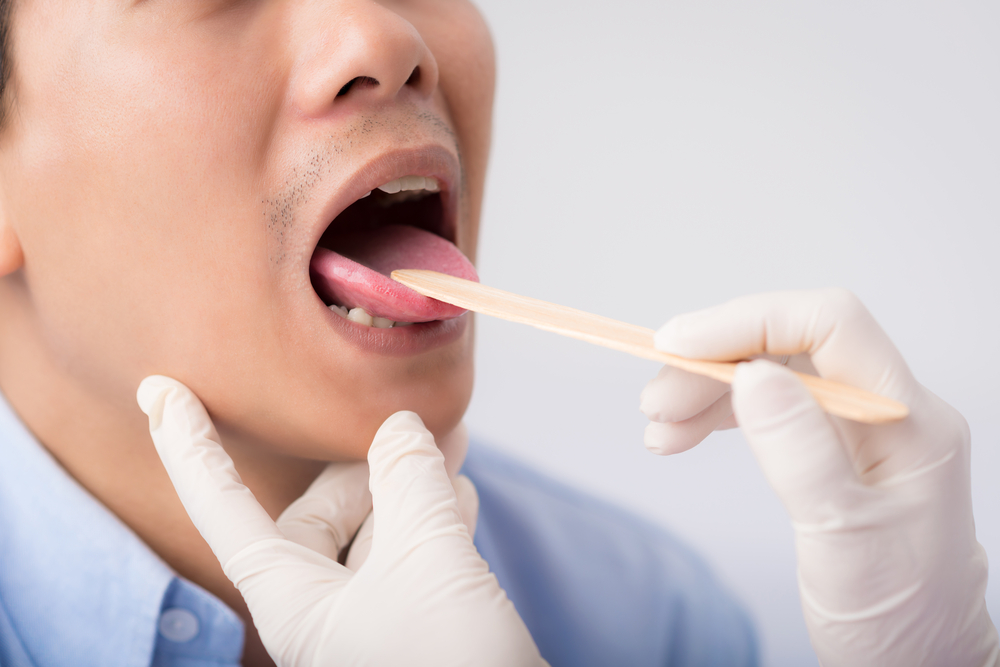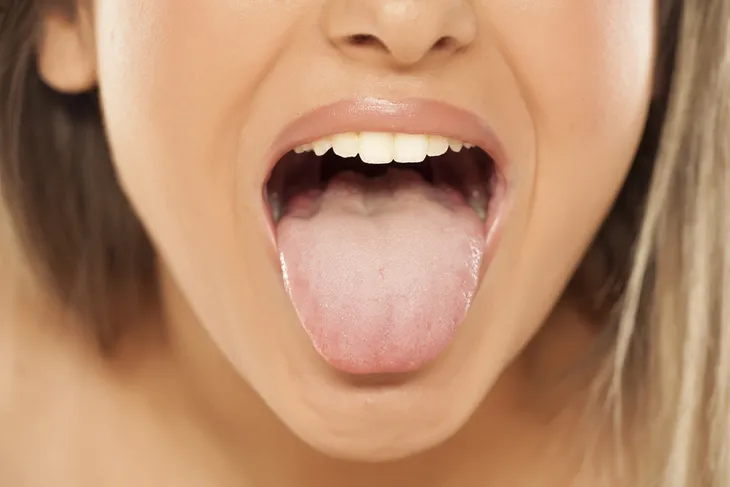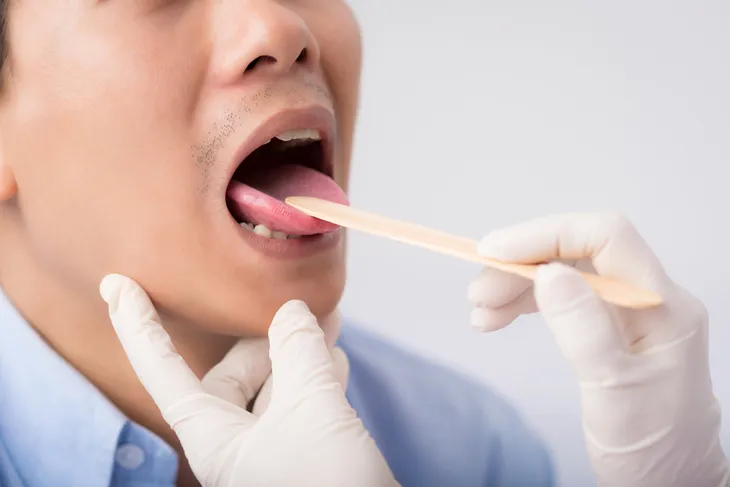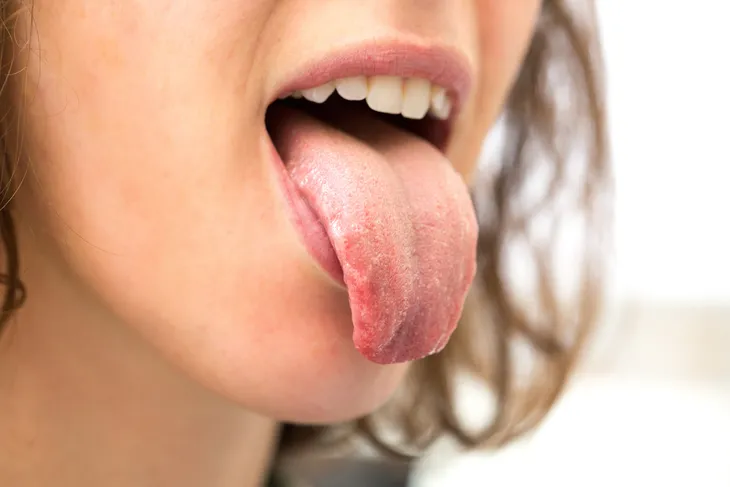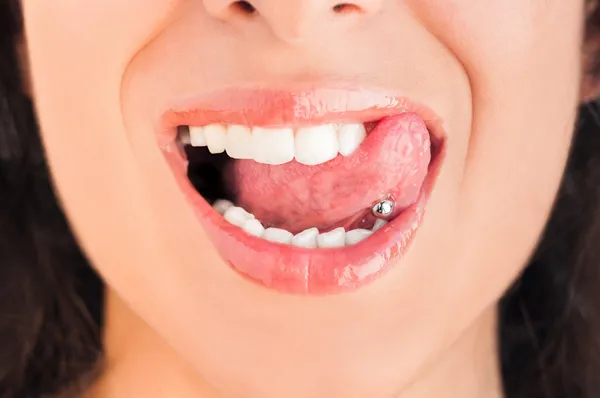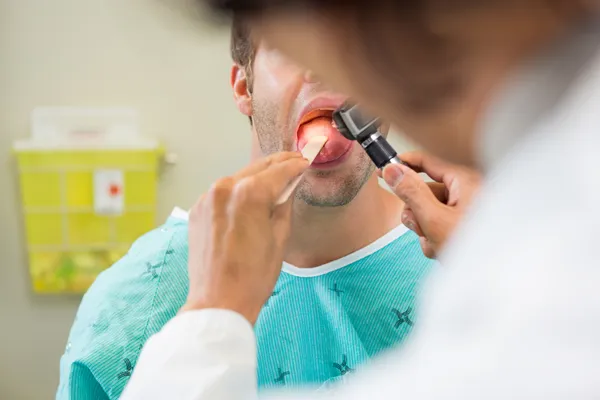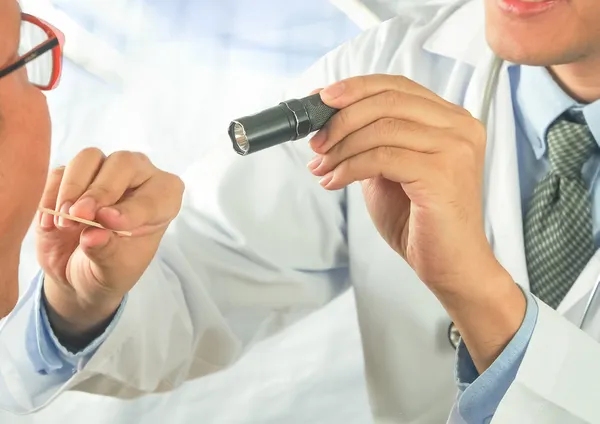The tongue is a small, muscular organ in the mouth that helps with tasting and swallowing food, as well as articulating speech. On occasion, however, the tongue may develop glossitis, a condition that causes it to swell, become red in color, and develop a smooth appearance on its surface.
There are a variety of different things that can cause glossitis and different types that a person can develop—both of which we’ll be discussing today, along with symptoms to look out for and how it is diagnosed and treated. Read on to find out more about glossitis with these 12 facts.
1. Type: Acute Glossitis
There are several different types of glossitis, one of which is referred to as acute glossitis. According to Healthline, this type causes “inflammation of the tongue that appears suddenly and often has severe symptoms.”
In addition to swelling, other severe symptoms include pain and shortness of breath (known medically as dyspnea). Acute glossitis most commonly occurs due to an allergic reaction or from trauma to the tongue, such as burns or bites.
2. Type: Chronic Glossitis
With chronic glossitis, inflammation of the tongue occurs on a long-term basis, and “may begin as a symptom of another health condition,” says AARP.org. Interestingly, chronic glossitis is more common than acute glossitis.
One subtype of chronic glossitis is known as chronic superficial glossitis, because it’s not the tongue itself that becomes inflamed but rather the mucous membrane that covers it. This particular type is especially common among alcoholics, tobacco users, and those who have chronic stomach or intestinal diseases.
3. Type: Atrophic Glossitis
According to Prime Health Channel, atrophic glossitis (also known as Hunter glossitis) “derives its name from the fact that the tongue gets washed away of its original color to assume a beefy red color and is automatically smoothened.”
And by smoothened, the source means that the tongue loses many of its papillae, which are the small bumps that normally cover the surface of the tongue. This can give the tongue a “glossy appearance,” says Healthline.
4. Type: Idiopathic Glossitis
Idiopathic glossitis “…is characterized by the inflammation of the mucous membrane and the overall muscle of the tongue,” says Prime Health Channel. Unfortunately, however, the cause of this particular type of glossitis is unknown.
As with atrophic glossitis, those with idiopathic glossitis will develop a smoothened tongue, often losing “up to 50-percent or more of the papillae,” says AARP.org, giving it the same glossy appearance.
5. Cause: Allergic Reactions
One of the most common causes of glossitis—particularly acute glossitis—is an allergic reaction. These allergic reactions may be to “medications, food, and other potential irritants that may aggravate the papillae and the muscle tissues of the tongue,” says Healthline.
Certain medications used to treat high blood pressure—known as angiotensin converting enzyme (ACE) inhibitors—are particularly common irritants, as are “mouthwash, breath fresheners, toothpastes, plastic in dentures, [and] dyes in candy…” indicates Prime Health Network.
6. Cause: Disease and Infections
Glossitis may also occur as a result of contracting a disease, particularly those that affect the body’s immune system, as they may “attack the tongue’s muscles and papillae,” says Healthline. Herpes simplex, “a virus that causes cold sores and blisters around the mouth,” is one such example.
Infections can also cause glossitis, including those caused by bacteria, yeast, or fungi (such as thrush, which produces “white patches on the tongue and inside of the mouth,” says WebMD). Poor oral hygiene and low saliva production (dry mouth) can also lead to infections, which increases a person’s chances of developing glossitis.
7. Cause: Vitamin Deficiencies
Another common cause of glossitis is vitamin deficiency. If you’re not getting enough iron, for instance, low myoglobin levels may result. This can lead to glossitis because “myoglobin is a protein in red blood cells that’s important for muscle health, including the tongue’s muscle tissue,” says Healthline.
Other vitamin deficiencies that can cause glossitis are vitamin B12, vitamin E, riboflavin, folate, and niacin. Regardless of which vitamin is the culprit, this type of glossitis is aptly referred to as glossitis vitamin deficiency.
8. Cause: Mouth Trauma or Injury
As mentioned earlier, trauma or injury in the mouth can lead to glossitis as well. Common examples include biting, cutting, chewing, or burning tissue of the tongue or elsewhere in the mouth. Additionally, inflammation may be caused dental appliances, such as braces or ill-fitting dentures.
And while it may look cool, piercing the tongue also increases the likelihood of developing glossitis, as it makes the muscular organ more susceptible to infections and wounds.
9. Symptoms
Although we’ve already mentioned several of the symptoms of glossitis, they are worth repeating. Pain or tenderness in the tongue is among the most common to be mindful of, as is swelling or inflammation.
In some cases, this swelling may become so severe that it affects a person’s ability to swallow, chew, or speak. If this occurs, it is important to seek medical attention immediately. The tongue may also change color, becoming pale or bright red, and take on a smooth appearance due to loss of papillae.
10. Diagnosis
When it comes to diagnosis, the U.S. National Library of Medicine says that your dentist or doctor will assess your condition by doing an exam to look for “finger-like bumps on the surface of the tongue (called papillae) that may be missing” and a “swollen tongue (or patches of swelling).”
Additionally, the individual conducting the exam may ask questions about your medical history and lifestyle in an effort to determine the cause of glossitis. Samples of blood and saliva may also be taken to help confirm the diagnosis.
11. Treatment: Medications
How glossitis is treated largely depends on what is causing the condition to occur. “If glossitis stems from a bacterial, fungal or yeast infection,” the Colgate-Palmolive Company says, “your medical or dental professional may prescribe a medication to alleviate the symptoms and heal the infection.”
In combination with antibiotics or other medications, topical corticosteroids may also be prescribed and are intended to help reduce symptoms of pain and redness in the tongue or other areas of the mouth.
12. Treatment: Home Care
In other cases of glossitis, home care procedures may be the best course of treatment. If the condition is caused by a virus, for instance, the Colgate-Palmolive Company says “…a doctor can recommend a routine plan to treat the symptoms at home. This plan involves keeping your tongue and whole mouth healthy by brushing twice daily and flossing.”
Or, if the glossitis is caused by a deficiency in certain vitamins, Prime Health Channel indicates it may be best treated by “preparing a diet chart and that is rich in the deficient nutrients.” And in cases where glossitis is due to an allergic reaction or irritant, it is important to identify the cause and eliminate or avoid it to prevent future reactions.
